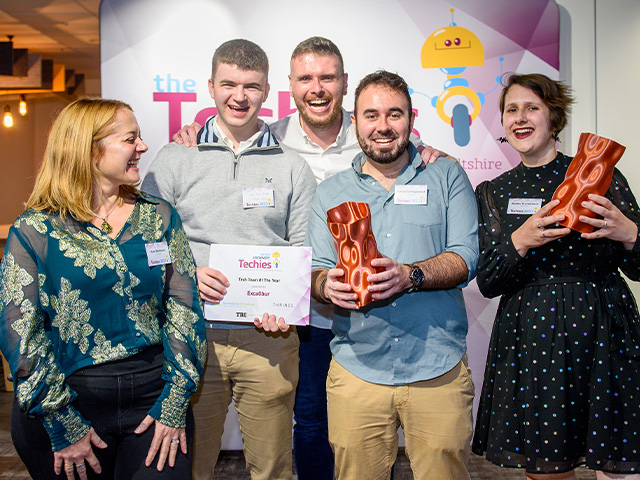Event Report : Swindon Technology and Innovation Forum Original article in Business Voice Jan/Feb 2013 Edition
The first Swindon Technology and Innovation Forum captured the imagination of local businesses who packed the conference room at Swindon Town Football Club. Organised by Swindon Chamber of Commerce and Swindon-based IT and communications experts Excalibur, business leaders came to hear about the latest technological advances, and to try out cutting edge devices. Following a welcome by Rosemary Wells, Head of Corporate & Political Engagement – Swindon Chamber, Darren Beggan – Head of Professional Services at Excalibur, introduced a concept that would be repeated often: “Work is what you do, not where you are.” Devices like smartphones and tablets were being integrated into businesses both large and small, and changing the way we work, he said. “The average employee gets another 240 hours of work a year done now, just by using their smartphone. By 2016 some 80 per cent of all servers will be virtual. Now iPads are used by doctors in hospitals to look atX-rays.” There are many ways in which innovation is changing the way we work. Young people who are digital natives will expect a flexible working lifestyle, by right with the same user experience across devices. Vikie Crowe, online partner Business Development Manager at Microsoft, heralded a new era: “We’re moving away from Microsoft being an IT provider to devices and services,” she said. The cloud-based 365 offers a connected user experience. Your phone, tablet, PC and Xbox all offer the same user experience. Data, mail, contacts and even settings are common across all devices. “Being cloud-based also guarantees that users will always have the most up-to-date version of the software” she added. From Research in Motion, channel sales manager Mark Simpson showed off the soon to-be released Blackberry 10 operating system. The QNX software, he said, is able torun eight or nine applications simultaneously, and sandboxes business and personal apps tokeep work and home life separate. “Blackberry is famous for keyboards, but now it’s all about touch screens,” he said, showing off a new form of predictive text that guesses the next word in a sentence and floats it above the virtual keyboard. “Typing the next word is as simple as touching it with your thumb,” he said. Roger Berry, Head of Small Business at Vodafone, said “technology could be embraced to slash costs, increase productivity and create a happier workforce. No-one at Vodafone, including the CEO, has their own desk, you sit with the people you’ll be working with that day. And coffee shops have replaced meeting rooms.” He added, “There’s no need to be at your own desk any more. Everyone has a mobile device on which to take calls and emails, your documents can be accessed via your laptop,and you don’t need to print anything, so there’s no need forfiling and storage.” Around 5,000 people work at Vodafone’s Newbury HQ every day, but space is required for just 3,500 of them. Only three per cent – mainly receptionists and security guards – require a fixed point from which to work. “We’ve saved a huge amount of space, because people are working from home or at events like this one,” said Roger, “People like to work this way.” “Technology has enabled a cultural change,” he said. “You give someone a piece of work to do, and you monitor that,” he said. “When you need to interact with your colleagues, go into the office.” During a Q&A session, lawyers from Thrings and Withy King answered questions about the legal aspects of technology and Specsavers Swindon were on hand to encourage members to think about eyesight when using gadgets and PCs. More details about this event can be found here.





